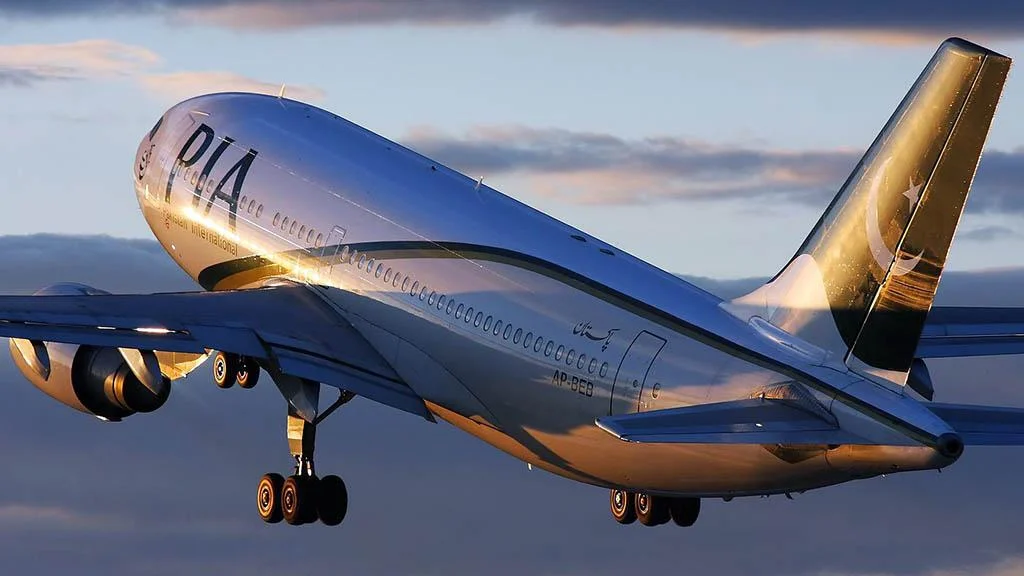- Web
- Feb 05, 2026
Parliamentary report links PIA’s decline to Open Sky Policy, management failures
-

- Web Desk Karachi
- Feb 26, 2025

ISLAMABAD: A parliamentary fact-finding committee has identified the expansion of Gulf airlines as a primary factor leading to the decline of Pakistan International Airlines (PIA), stating that these airlines have transported passengers beyond the limits of their bilateral service agreements.
The implementation of the Open Sky Policy has resulted in a dramatic reduction of PIA’s market share from 50 percent to just 20 percent. The report, which was submitted to the National Assembly Standing Committee on Privatisation, also pointed to frequent management changes, often involving the appointment of inexperienced personnel, as a contributing factor to the airline’s struggles, reported The Express Tribune.
The committee has proposed the establishment of an Inquiry Commission to look into the conduct of former Aviation Minister Chaudhry Ghulam Sarwar, whose “irrational statements caused PIA losses amounting to $600 million over four years.”
The fact-finding committee is led by Pakistan People’s Party MNA Sehar Kamran and presented its findings to the committee on Tuesday.
The report highlights that as a result of the Open Sky Policy, international airlines currently operate 100 flights weekly to and from Pakistan. Other challenges facing PIA include an outdated fleet, financial difficulties, and high taxes hindering fleet expansion.
According to the findings, PIA’s liabilities have surpassed Rs740 billion, which includes dues to vendors, fuel costs, and loans backed by the government.
Recommendations from the committee included implementing structured financial support, akin to international models where national carriers receive subsidies and tax reliefs and called for a stable leadership within the airline. Despite the intention behind the Open Sky Policy being to improve competition and service quality, it has significantly affected PIA’s ability to compete with international carriers, particularly those from the Gulf region that benefit from substantial government financial support.
Kamran, the head of the sub-committee, noted that the Open Sky Policy was instrumental in slashing PIA’s market share from 50 percent to a mere 20 percent. The proliferation of foreign carriers, especially from the Gulf, has taken over key international routes, forcing PIA into a precarious position.
A significant issue pointed out in the report is the extensive reliance on the “sixth freedom” by Gulf, UAE, and other international airlines. This allows them to transport passengers and cargo from Pakistan to additional destinations beyond the confines of the original bilateral Air Services Agreements. Consequently, Gulf airlines can carry passengers with layovers in their home countries, which further undermines PIA’s competitive position.
In the last decade, PIA has attempted to focus on maintaining crucial domestic and select international routes. However, during this timeframe, airlines such as Emirates, Qatar Airways, Turkish Airlines, and Etihad Airways have substantially increased their flights to Pakistan, with over 100 operations weekly, as per the report’s findings.
Compared to 2000, PIA’s passenger count has plummeted by 26% in 2024, showcased by a significant reduction in operations despite the country’s growing middle-income demographic.
The scope of the inquiry encompassed the ramifications of the Open Skies Policy enacted by different administrations, as well as sovereign guarantees to PIAC, the grounding of 21 PIA aircraft (including Boeing 777s), the staff-to-aircraft ratio, reasons behind the lack of flights to major regional nations, failures in business strategy, historical recruitment issues, and the status of non-core assets.
The government had previously sought to privatise PIA but was unsuccessful. Secretary of the Privatisation Commission Usman Bajwa informed the committee that $4.3 million (Rs1.2 billion) had been spent on financial advisory services from Ernst & Young and an additional $2.6 million would be paid following the second attempt at privatisation, although he did not provide a definitive timeline for the release of the Expression of Interest to attract potential bidders for PIA.
At present, only six out of twelve Boeing 777 aircraft are operational, while the remaining planes remain grounded due to financial hardships.
Of the total 32 aircraft, merely 19 are currently in service.
PIA privatisation on the backburner as government prioritises power sector reform
The situation has deteriorated in part due to high taxes on fleet expansion and maintenance, along with delayed procurement of essential parts, all of which have impeded PIA’s ability to compete with regional counterparts.
To address its fleet shortage, PIA turned to wet leasing alternatives; however, this decision resulted in financial losses and harmed the brand’s reputation.
For instance, a wet-leased aircraft that serviced the Islamabad to London route under the Premier Service incurred total losses of Rs2.9 billion, including Rs1.1 billion in operational deficits, as highlighted in the report. Notably, this London Premier Service was launched despite feasibility reports forecasting financial losses.
The committee also noted that PIA’s code-sharing partnership with Turkish Airlines, initially seen as a strategic move to enhance the airline’s international connectivity, ended prematurely due to internal opposition from the PIA Pilots’ Association and political resistance.
Also, the introduction of the Golden Handshake Policy intended to lay off about 3,000 employees resulted in the loss of many highly skilled engineers and technical staff, who later found employment with rival airlines.
The report detailed that PIA is struggling with elevated workforce costs, reporting an employee-to-aircraft ratio of 215, which slightly surpasses the industry average of 200.
The fact-finding committee put forward several recommendations aimed at ensuring leadership stability, investing in fleet expansion, enhancing service quality, carrying out financial restructuring, and reinforcing supportive aviation policies to elevate PIA’s service delivery.
Moreover, it urged that all future privatisation efforts be accompanied by strategic restructuring, addressing historical mismanagement, promoting transparent governance, and securing sustainable financial backing.
The committee also advocated for the formation of an Inquiry Commission to investigate the former Aviation Minister’s remarks regarding PIA pilots, as this controversy, along with the ensuing ban by the European Union Aviation Safety Agency (EASA), has led to an estimated $600 million in revenue losses for PIA over the previous four years.




